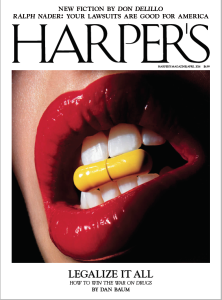 It’s time we admitted that the war on drugs was lost the day Nixon announced it.
It’s time we admitted that the war on drugs was lost the day Nixon announced it.
This is a great piece from Harpers detailing why all drugs, not just pot, should be legalized.
I paid for the piece, click here to download it:
Harpers_Legalize_It_All
I’ve been saying for years that drugs and prostitution should be legal. Because imagine if everyone could get baked and then go get laid. I think it’d help with reducing some of the tension out there.
Here in CO, the economy is going off and it’s because of the weed. I talk to people on the chairlift who are vacationing here, because they can get stoned and not have to worry about being arrested. There’s so much money in our state right now, it’s coming off the bud. Everyone I talked to has just moved here. In Denver if you put your house up for sale in the morning, you’ll have a bunch of offers by Noon. There’s young people everywhere on the front range. The best looking people I’ve seen aren’t in CA or NYC — they’re here. If you can’t get laid here, you can’t get laid. Tech was big in the Peoples Republic of Boulder before. Now, there’s startups everywhere. Construction workers are making a lot of money remodeling, installing HVAC and electrical systems for the weed shops. A few thousand people show up to do yoga at Red Rocks, it sells out fast. Dude. Colorado is booming and it’s all because of the weed.
We can buy a gun, use it to kill someone. Stores sell pesticides that kill us. We can buy food that kills us. We can buy a car, drive the car off a cliff. But we can’t buy drugs or pay to do what we do behind doors each day (some of us anyway). That’s bunk.
Stories like this one are proof positive about how wrong we are on drugs. Want facts? How about all the people we’ve put in jail for drugs? BTW, the Clinton’s had a lot to do with this.
In my dream my friends Brook and Rose LeVan would stop raising cows and start growing weed.
Legalize drugs and prostitution.
From the piece:
In 1994, John Ehrlichman, the Watergate coconspirator, unlocked for me one of the great mysteries of modern American history: How did the United States entangle itself in a policy of drug prohibition that has yielded so much misery and so few good results? Americans have been criminalizing sychoactive substances since San Francisco’s anti-opium law of 1875, but it was Ehrlichman’s boss, Richard Nixon, who declared the first “war on drugs” and set the country on the wildly punitive and counterproductive path it still pursues.
I’d tracked Ehrlichman, who had been Nixon’s domestic-policy adviser, to an engineering firm in Atlanta, where he was working on minority recruitment. I barely recognized him. He was much heavier than he’d been at the time of the Watergate scandal two decades earlier, and he wore a mountain-man beard that extended to the middle of his chest. At the time, I was writing a book about the politics of drug prohibition. I started to ask Ehrlichman a series of earnest, wonky questions that he impatiently waved away. “You want to know what this was really all about?” he asked with the bluntness of a man who, after public disgrace and a stretch in federal prison, had little left to protect. “
“The Nixon campaign in 1968, and the Nixon White House after that, had two enemies: the antiwar left and black people. You understand what I’m saying? We knew we couldn’t make it illegal to be either against the war or black, but by getting the public to associate the hippies with marijuana and blacks with heroin, and then criminalizing both heavily, we could disrupt those communities. We could arrest their leaders, raid their homes, break up their meetings, and vilify them night after night on the evening news. Did we know we were lying about the drugs? Of course we did.”
I have been an advocate for full legalization of drugs and other substances for years. Restricting or banning drugs on the free market destabilizes the economy. Research Martin Shkreli and pharmaceuticals in recent news. Obviously there is some concern to public health and safety, but if the substance is legalized and properly monitored so much more good can come of it:
– Research on the substances effects (positive and negative) on a much wider audience
– Tax Revenue (Schools, Roads, etc.)
– Jobs
– Clean Regulation (as in it completely cripples the black market because now you have competing entities that have obtained proper licensing that drive the price down so far it’s no longer lucrative to sell the substance illegally)
– Addiction Awareness/Education
– Further economic growth as formentioned in secondary fields like HVAC installation, new construction, packaging.